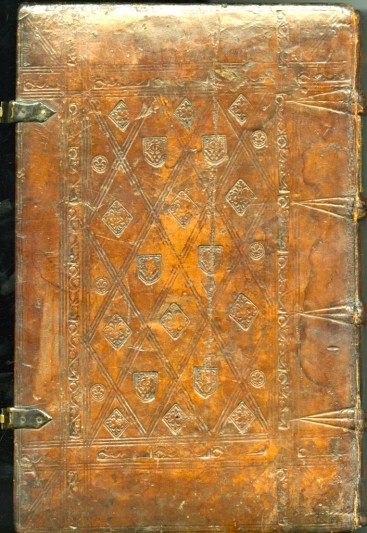An edition of the complete works of the Latin grammarian Priscian, whose writings were used as the basis for the teaching of Latin grammar until the fifteenth century and as a source for extracts from classical authors whose works have otherwise been lost. Edited by Benedictus Brognolus, the well-known Venetian editor of classical texts and teacher of grammar, rhetoric and philosophy, and printed in Venice by Filippo Pinzi in 1492, it is currently recorded in only four UK libraries.
The book is bound in contemporary blind-stamped calf over wooden boards, utilising a series of tools which have long been attributed to a bookbinder, or possibly bookseller, active in Cambridge in the fifteenth century. The binder, referred to as W.G. after the monogram found on his most distinctive tool, was active in Cambridge between c.1478 and 1507, indicating that the Priscian was in use in Cambridge within fifteen years of its printing.
Important though this edition is, it is the history of this particular copy which makes it such an important acquisition for Cambridge University Library. The book is bound in contemporary blind-stamped calf over wooden boards, utilising a series of tools which have long been attributed to a bookbinder, or possibly bookseller, active in Cambridge in the fifteenth century. The binder, referred to as W.G. after the monogram found on his most distinctive tool, was active in Cambridge between c.1478 and 1507, indicating that the Priscian was in use in Cambridge within fifteen years of its printing. Furthermore, the book contains early marginalia in at least two hands which, if proved to be English, might suggest that it remained in circulation in England well into the seventeenth century. It also contains as a pastedown a full folio leaf from a thirteenth-century manuscript of civil law. Both the annotations and the manuscript pastedown may provide valuable insights into the book market and intellectual life in Cambridge at the time.
The volume’s later history is equally intriguing. In the seventeenth century the book was decorated with the arms of the Potier de la Morandière family, presumably in France, yet by the end of that century it appears to have returned to England--it bears the late-seventeenth or early-eighteenth-century annotation: 'At the Fox & Crown in Barbakin for Mr Goodwin’. At some point in its post-Cambridge history the volume has also been delicately decorated; it bears five finely executed illuminated initials.
Priscian is not currently well represented in Cambridge University Library’s pre-1501 collections. The Library has only four of the twelve incunable editions of the author’s collected works, two of 1476, one of 1485 and one of 1500. The Pinzi edition is a reprint of the 1488 edition of Giorgio Arrivabene, also lacking from the University’s collections, so textually and typographically, as the earliest example of Filippo Pinzi’s printing thus far within the University Library, the 1492 edition fills significant gaps in the collection. Furthermore, it bolsters the already strong fifteenth- and sixteenth-century holdings for this author across Cambridge. Alongside significant sixteenth-century holdings, there are incunable editions of the Opera at the Fitzwilliam Museum, Christ’s College, King’s College, Trinity College, Emmanuel College and St. John’s College, but no copy of the 1492 Pinzi edition.
The Priscian has the potential to offer new insights into the movement, trade, use and binding of books in Cambridge in a period before the establishment of the city’s first printing press in 1521/2. Study of the annotations will further our understanding of the ways in which Priscian, and incunabula more generally, were received and used soon after publication, especially in Cambridge, and also offer evidence of the way such books circulated within Europe from the late fifteenth century onwards. The support of the Friends has allowed this remarkable book to return, after a very long holiday, to Cambridge, where it will now remain in perpetuity.
This grant was awarded from FNL's B. H. Breslauer Fund, thanks to the generosity of the President and Officers of the B. H. Breslauer Foundation.
